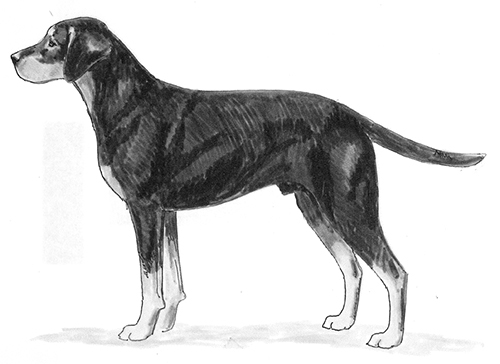Montenegrin Mountain Dog
Scenthound Group
The goals and purposes of this breed standard include: to furnish guidelines for breeders who wish to maintain the quality of their breed and to improve it; to advance this breed to a state of similarity throughout the world; and to act as a guide for judges.
Breeders and judges have the responsibility to avoid any conditions or exaggerations that are detrimental to the health, welfare, essence and soundness of this breed, and must take the responsibility to see that these are not perpetuated.
Any departure from the following should be considered a fault, and the seriousness with which the fault should be regarded should be in exact proportion to its degree and its effect upon the health and welfare of the dog and on the dog’s ability to perform its traditional work.
History
This version of the Balkan hound was developed in the Republic of Montenegro. The first standard dates to 1924.
The Montenegrin Mountain Hound was recognized by the United Kennel Club in 2008.
General Appearance
Medium sized, solid, and agile.
Characteristics
Docile, trustworthy and attached to his master.
Head
SKULL
The skull is longer than it is wide. It is flat or slightly arched. The frontal furrow is accentuated, and the occiput is not prominent. The stop is slightly pronounced.
MUZZLE
The muzzle is thick, broad at the base, and shorter than the skull. The nasal bridge is straight, and the toplines of the skull and muzzle are divergent. The cheeks are flat. The upper lip slightly overlaps the lower. The lips have black edges.
TEETH
The Montenegrin Mountain Hound has a complete set of evenly spaced, white teeth meeting in a scissors or level bite.
Disqualifications: Overshot or undershot bite. Missing teeth, other than the 1st premolars.
NOSE
The black nose is well developed.
EYES
The oval shaped eyes are set slightly obliquely. They are light to dark brown in color, with black rims.
Disqualifications: Wall eyes. Eyes of different colors. Entropion. Ectropion.
EARS
High set, moderately long and pendant, carried without folds and close to the head. The ears are fairly oval in shape.
Neck
The neck is long, thin, muscular and clean.
Forequarters
The shoulder blades are long, muscular, and well laid back.
FORELEGS
The legs are straight and strong with close fitting elbows. The distance from the elbow to the ground is one-half the height at the withers. The pasterns are strong but thin and slightly sloping.
Body
The body is about 10 percent longer than it is tall. The chest is strong, deep and well rounded. The withers are very pronounced and the back is broad and muscular. The loin is short and solid. The croup is slightly sloping, broad and muscular. The belly is only slightly tucked up.
Hindquarters
The hindquarters are strong and muscular with solid bone structure.
HIND LEGS
The upper and lower thighs are about the same length. The angulation of the stifle is about 120 degrees. The hock joint is pronounced and has angulation of about 135 degrees.
Feet
Cat feet, with tight, well arched toes and elastic, black pads. The nails are always black.
Tail
The tail is set on the line of the croup and tapers towards the tip, which reaches to the hock. It is carried below the level of the back, in saber fashion, and is covered with abundant hair.
Disqualifications: Curled tail. Tail carried above the backline.
Coat & Skin
Short, dense, rough, smooth and glossy. The undercoat is well developed. The skin is elastic and very tight to the body.
Color
Black ground color, with tan markings above the eyes, on the muzzle and on the lower legs. The tan may be pale red to brownish red to bright red. A small white spot on the chest is acceptable but not desirable.
Disqualifications: Any other color. Any white markings other than a small white spot on the chest.
Height
Height at the withers is from 17 to 21 inches.
Gait
Elastic, lively and even, with strong drive from the rear.
Eliminating Faults
(An Eliminating Fault is a Fault serious enough that it eliminates the dog from obtaining any awards in a conformation event.)
Height over or under the prescribed sizes.
Disqualifications
(A dog with a Disqualification must not be considered for placement in a conformation event, and must be reported to UKC.)
Unilateral or bilateral cryptorchid.
Viciousness or extreme shyness.
Albinism.
Overshot or undershot bite.
Missing teeth, other than the 1st premolars.
Wall eyes.
Eyes of different colors.
Entropion.
Ectropion.
Curled tail.
Tail carried above the backline.
Any other color.
Any white markings other than a small white spot on the chest.

Looking for a Dog?
Find a dog that will fit your family.
Note: The breeders on this list are not endorsed by UKC.
Revised July 1, 2009
©Copyright 2008, United Kennel Club
